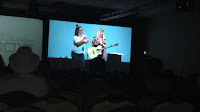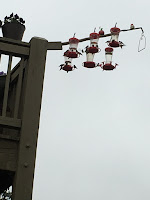 |
| Scott Barry Kaufman |
He reminded us that creativity is connected with messiness, that humans are always a mix of things, never just genius or just insane, and to have a positive outlook on life to foster creativity.
One of his terms is harmonious passion -- people who have it, who are harmonious passionate, tend to be secure in themselves, willing to take risks, autonomous and have/had a strong mentor. He reminded us that mindfulness is about reducing suffering of others, and that 10,000 hours of practice is not a straight line to accomplishment but a wobbly line of trial and error.
University of North Florida has created five Canvas templates that they are essentially giving away for free. Two are designed with Design Studio, the others are straight Canvas. The templates are guided by Quality Matters rubrics, and table explains how each template implements a particular QM criterion: http://www.unf.edu/cirt/services/id/resource_online-course-template.aspx
From their experience, these templates kickstart faculty use of Canvas while ensuring that a lot of information about university resources, tech help and other support is already part of the content.
Jeff Faust reminded me of a number of tools in Canvas that can be used to individualize student learning: careful set up of modules so that students can pick and choose how they want to accomplish a particular learning outcome; selective release of assignments to give different options to different students, turn on anonymous grading for less bias towards students, choice of format for assignments, and so much more.
He briefly mentioned a new Ted tool -- TedTalks teamed with Watson to create a powerful search engine inside their site that allows you to ask a question and it creates a play list of TedTalks and parts of them answering the question: http://watson.ted.com/welcome
He reminded us of Carol Tomlinson's statement that "It's
our job to see them all as successful and then create the learning environment
that does that."
Jared Stein's keynote on how Canvas helps with engagement and accessibility for all talked about behavioral, cognitive and emotional engagement. His examples from the University of Auckland, and a South Carolina School of the Blind and Deaf were very powerful, showing how Canvas helps connect students who fell isolated in a higher education setting and how the Canvas tools allow students who are physically isolated to connect with others and to learn.
And then he showed us how he can talk to Canvas through amazon's Alexa -- very cool! At this point, the intents are still limited to just a few (students -- what do I have to do, what are my grades; instructors - what do I need to grade; parents -- how can I support my child) -- but this is going to grow.
Another new release is the new app (iOS and Android) Canvas for Teachers. While this does not give teachers everything in Canvas yet, it does now allow you to grade online, annotating (works esp well with Apple Pencil), grading, announcing and communicating with students. Find the yellow Canvas icon and start using it -- folks in the audience were already and were quite happy with it.
Penn State has an LTI that allows for peer evaluations in group work -- this looks very promising! And finally the Business School at Stanford came up with an interesting use of Qualtrics by creating one-question surveys and then embed these surveys into Canvas pages to get feedback from students on content comprehension. Unfortunately, this is not a sustainable model as it does take a lot of work to set up all these surveys and allows for little flexibility.





